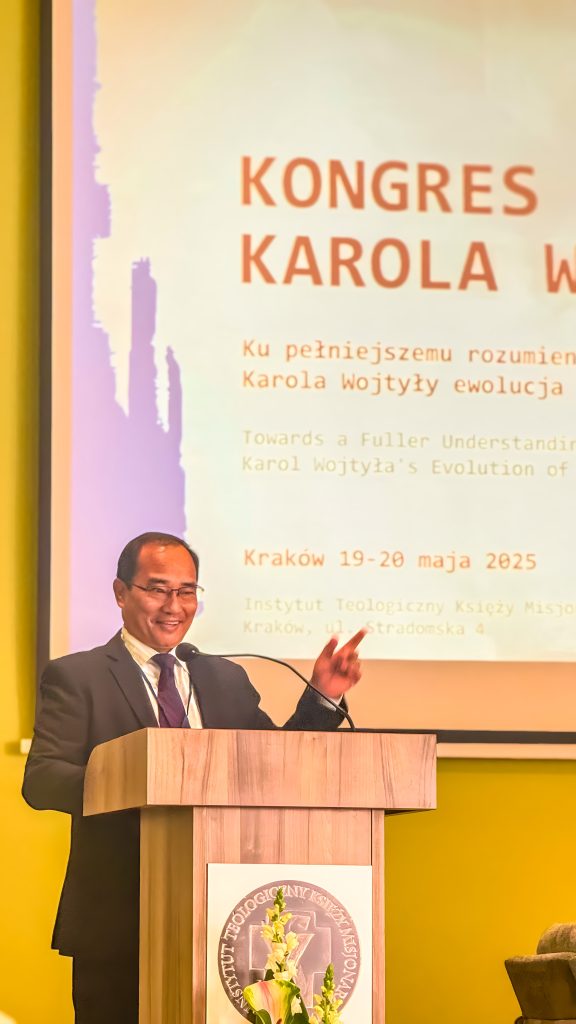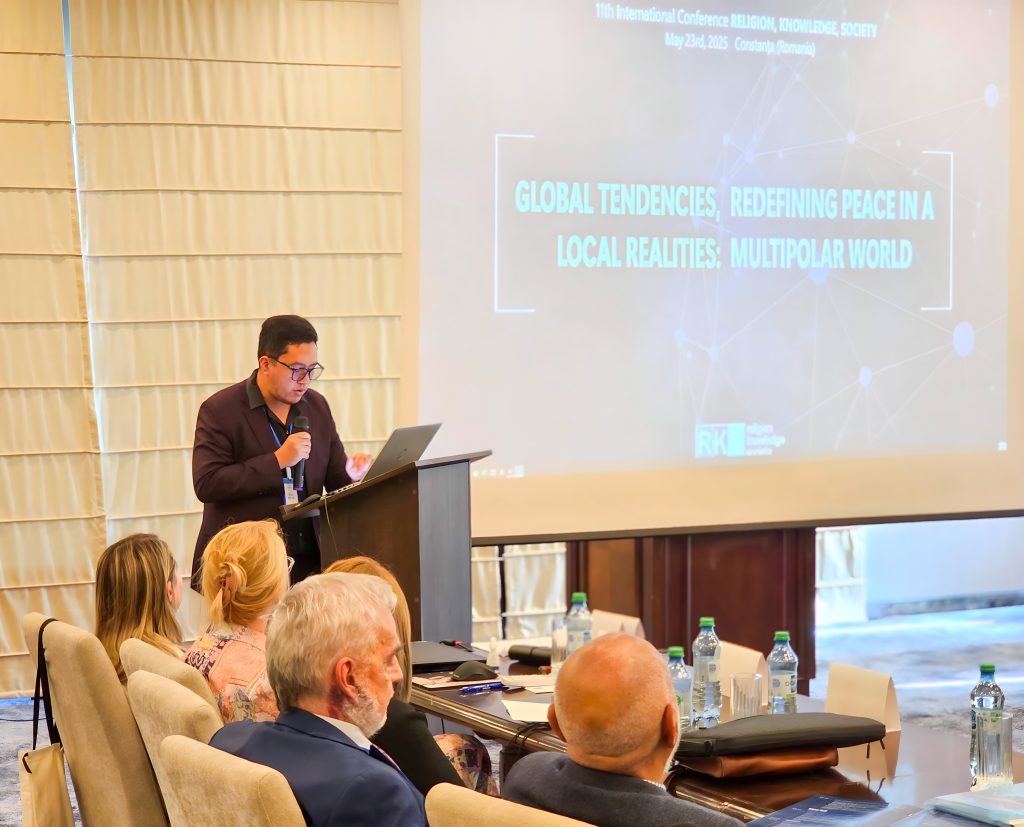Professor Jove Jim S. Aguas, Ph.D., of the Department of Philosophy of the Faculty of Arts and Letters, and Assistant Professor Blaise D. Ringor, Ph.D., of the Institute of Religion—both are also adjunct professors of the Ecclesiastical Faculties and are faculty researchers of the Research Center for Theology, Religious Studies, and Ethics—served as keynote and plenary speakers at three major scholarly gatherings held in Poland and Romania in May 2025. These events—spanning themes of virtue, peace, and reconciliation—affirmed the enduring intellectual mission of the Catholic university within a world confronting wars and political divisions.


The first of these gatherings took place on May 19 at the Pontifical University of John Paul II in Kraków, during the Karol Wojtyła Congress. The event drew philosophers, theologians, religious, and academics from multiple nations to reflect on the philosophical and moral legacy of the Polish pontiff. The congress highlighted Karol Wojtyła’s enduring relevance in articulating an anthropology grounded in freedom, transcendence, and moral responsibility. Under the vaulted shadow of Saint John Paul II’s thought, the participating scholars bore witness to a common conviction: that the dignity of the person must once again stand at the center of both culture and the Church’s evangelical mission.
In this conference, Prof. Aguas presented a keynote lecture titled The Perfection of Power and Integration of the Person: St. Thomas Aquinas and Karol Wojtyła on Virtue. In this comparative study, he demonstrated how Aquinas’s metaphysical account of habitus and Wojtyła’s personalist ethics converge upon a vision of the virtuous person as one whose powers are perfected through reason and grace. Moral character, he argued, is not formed by coercion or social convention, but by the disciplined development of excellence rooted in freedom.
Asst. Prof. Ringor followed with a paper titled Divinus in Caro: Karol Wojtyła’s Ontological Personalism In-Between Theomorphism and Technomorphism. His lecture identified two errors in contemporary anthropology: the theological exaggeration that obscures human distinctiveness in the divine, and the technological reduction that empties the person of transcendence. Against both, Ringor proposed Wojtyła’s vision of the acting person—rooted in the Incarnation—as a mediating path that upholds dignity without distortion. The human being, he insisted, is divinus in caro, an embodied subject called to freedom, responsibility, and participation in truth.
From Kraków, the two Thomasian scholars proceeded to Romania, where they participated in the 11th Religion, Knowledge, and Society Conference at Ovidius University of Constanța on May 23. With the theme Global Tendencies, Local Realities: Redefining Peace in a Multipolar World, the conference brought together intellectuals from diverse contexts to address the spiritual and ethical challenges of the twenty-first century. Alongside them are the notable experts in the field of Religion, Philosophy, and Theology such as Professor and Academician Mircea Dumitru, who is a former Minister of Education of Romania and is currently the Vice-President of Romanian Academy, Professor Daniela Dumitru, from Bucharest University of Economic Studies, Professor William Barbieri from the Catholic University of America, Washington, D.C., USA, Professor Abdul Rashid from the University of Karachi, Pakistan, Professor Bryan Hall and Professor Erica Ferg from Regis University, USA, Father Pavol Dancak from the University of Presov, Slovakia, Professor Jérôme Grosclaude from the Université Clermont Auvergne, France, among others.
Aguas delivered a keynote lecture on Global Solidarity: A Key Component in Attaining World Peace. His presentation explored solidarity as both a social virtue and an ethical demand for justice. In an age marked by geopolitical fragmentation, systemic poverty, and invisible violence, he argued that peace cannot emerge from neutrality or detachment. Rather, it must be forged through the shared moral obligation to safeguard the dignity of every human person. Solidarity, Aguas maintained, is not only a political principle but a spiritual vocation.
Meanwhile, in his plenary lecture, Whose God is in the City? Political Ontology, Religious Plurality, and the Indispensable Desire for Peace, Ringor addressed the transcendental disconnection of the modern city. Recovering classical and Christian notions of the polis and the civitas Dei, he described the city not merely as a political arrangement but as a metaphysical form shaped by its orientation toward the divine. The loss of this orientation, he argued, has led to fragmentation and technocratic domination. Peace, he insisted, can only be restored when cities reclaim their identity as ordered expressions of communal life grounded in transcendent truth.
The final segment of their academic mission unfolded at the 11th Religion, Knowledge, and Society Seminar, also hosted by “Ovidius” University in Constanța, held at Suceava in Vatra Dornei, Romania from May 25 to 28. Centered on the theme Pathways Towards Reconciliation: Philosophical and Theological Approaches, the seminar invited participants to reflect on how religious, philosophical, and social traditions may contribute to healing divisions—both historical and contemporary.
Aguas contributed the paper Reconciliation Through Dialogue: Philippine Experience, which examined interreligious dialogue as a path toward national and regional harmony. Focusing on the Philippine context, he explored how respect, openness, and shared moral foundations can bridge long-standing cultural and religious divides. Dialogue, he emphasized, is not a matter of diplomacy but of conversion—an ethical process that restores trust by grounding difference in mutual recognition of human dignity. Ringor concluded the seminar with his lecture “Remember Me When You Come Into Your Kingdom”: Suffering, Repentance, and Mercy. Drawing from Augustine and Aquinas, he described sin as a metaphysical disorder and reconciliation as the reestablishment of justice through grace. He examined suffering not as punishment alone but as an opportunity for purification and moral restoration. True reconciliation, he concluded, occurs not through legal resolution but through the embrace of mercy and the restoration of love’s proper order.
For the University of Santo Tomas, the participation of Aguas and Ringor in these international engagements reaffirms its identity as a Pontifical institution in communion with the Church’s global intellectual mission. Their contribution reflects the vision of the Apostolic Constitution Veritatis Gaudium, which calls for “the urgent need for ‘networking’ between those institutions worldwide that cultivate and promote ecclesiastical studies,” so that they may serve “the new stage of the Church’s mission” (§4.d).


